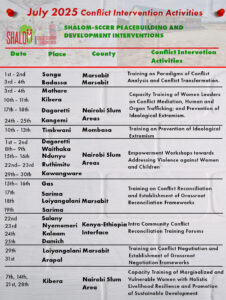By Gregory Ngichabe

Approaching Njoro town.
Njoro is located in Nakuru County just 20 kilometres from Nakuru town, it consists of 6 wards, namely; Kihingo, Mau-Narok, Mauche, Njoro, Lare and Nessuit. These wards are fairly ethnically diverse and are inhabited by the Kikuyu, Kalenjin, Luo, Kisii, and Ogiek among others; the Kikuyu and Kalenjin being the most prominent ethnic groups. The conflict in Njoro cannot only be attributed to the 2007-2008 Post Election Violence, the conflict in this area can be traced back to 1992. Since the advent of multi-party politics in 1992, Ndeffo and Mauche trading centres in Njoro Constituency, Nakuru County, have been synonymous with post-election chaos. Land ownership wrangles, ethnic polarisation and political power struggles, often involving the Kikuyu and Kalenjin communities, have often culminated in tribal clashes each election year. In the wake of the violence, families are misplaced, property destroyed and social amenities such as markets and schools abandoned.

Group Discussions – mapping out the conflict in Njoro.
The violence that broke out following the 2007 disputed presidential election results hit Ndeffo and Mauche hard, many people were killed and hundreds displaced. But fast forward to 2017, and the animosity has been replaced with a fervent commitment to ensure peaceful co-existence. In the last ten years, peace-building activities have been initiated and implemented to build bridges between ethnic groups. SCCRR has worked in Njoro over the last number of years and recently conducted a two day workshop and witnessed the new-found harmony in a region where the Njoro-Mau-Narok road once stood as a barrier between the two communities
The immediate effects of the conflict in Njoro led to loss of lives, women being raped, loss of property especially homes, land and livestock. The deep rooted effects of the conflict created an air of mistrust and bitterness especially for those who lost loved ones and properties, many are still traumatized by the events that unfolded. The conflict led to many people becoming refugees in their own country and were termed as Internally Displaced Persons (IDPs).

Participant presents some group work on the trend of conflict in Njoro.
Shalom’s intervention requested through the state and religious organisations was to ensure that those on the ground were trained on elections majorly focusing on conflict preparedness and management. Through the Diocese of Nakuru, SCCRR was able to get in touch with the grassroots leadership who managed to attend the training, where a total of 31 key influential opinion shapers attended. During the two day workshop, the leaders acquired the knowledge on how to prepare for elections and ensure that there was peace. SCCRR conducted interviews with key participants to gauge the mood of Njoro as they approached the 2017 General Elections. Most were positive that there will not be a repeat of the 2007-2008 Post Election Violence as long as the message of peace is spread in the area.
During the workshop, the participants cited various issues that plagued the area that if not checked could bring about tension. These issues included resource allocation, incendiary politics, nepotism, misguided perceptions, theft of livestock and poor leadership were common problems being faced by the people regardless of ethnic origin. They also identified the stakeholders who can be placed at the centre of these issues they cited; such as politicians, whom they claimed ran divisive political campaigns. Others were; ethnic gangs, the media; especially social media, wealthy business people, the youth and last but not least they included themselves as part of those who contribute to violence.

Group photo of participants from Njoro.
Facilitated by SCCRR, the participants saw the need of establishing an early warning system that will involve the Njoro area administration, NGOs, CBOs, grassroots leaders and the residents of Njoro. One of the participants cited the use of twitter and other social media platforms in playing a role in the Early Warning Systems preparation. They also established an action plan on how to move forward in tackling the issues they raised in the workshop. SCCRR is committed to supporting them in the coming months as they try to achieve the goals of the action plans before the 2017 General Elections.

